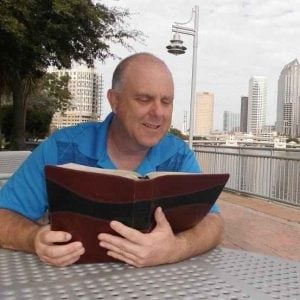
Back in my literature evangelism days, I was sitting in the Oklahoma Adventist conference president’s office along with 4 or 5 other literature evangelists. We were discussing what one book, in addition to the Bible, we should be promoting for these last days. One person said we should be promoting books warning people about the mark of the beast. I suggested if we promoted books like The Desire of Ages, and encouraged people to fall in love with Jesus, then when the mark of the beast becomes an issue, people will make the obvious choice and follow Jesus. A few of them agreed.
Several years later I was in a vespers service at my church, where the group doing the presentations were telling us that instead of preaching the three angels’ message, we should be preaching the gospel. Apparently they did not understand the three angels message is the gospel. The first angel has the everlasting gospel which prepares us for judgment. The second angel warns us against choosing man-made religions instead of God. The third angel warns us against trusting in our own works to save us instead of resting on God’s Sabbath and letting Him save us.
Over the years I have heard people say Seventh-day Adventists should not be preaching about every-day living but should be warning people about last day events. I hope those of you who have been following my my ministry over the last 30 years have found it to be balanced. I have done my best to stay Jesus-focused, and present our Bible teachings and crucial themes like the great controversy and the three angels’ message in the light of the cross. Here is why I believe we need to have a balanced blend of the cross in all our teachings, especially about last day events.
Or do you despise the riches of His goodness, forbearance, and longsuffering, not knowing that the goodness of God leads you to repentance? Romans 2:4 NKJV
Notice first, our repentance does not lead to God’s goodness. God’s goodness leads us to repentance. Therefore, if we want the world to repent and prepare for the judgment, shouldn’t we be preaching about God’s grace and goodness? The Conflict of the Ages series, which covers the great controversy from start to finish, begins Volume 1 (Patriarchs and Prophets) of that series with one sentence. That same sentence is the very last sentence in the last book of the series. That one sentence is not “Sunday is the false Sabbath.” The author of this series well knew Sunday was not the Sabbath, but that is not the main focus of her Conflict of the Ages series. That one sentence is not, “The Ten Commandments can be obeyed.” Again she well knew that, by God’s grace, we can live in harmony with God’s law. These are important aspects to consider in the great controversy, but the opening and closing sentences in the entire Conflict of the Ages series is, “God is love.” The number one reason the Seventh-day Adventist church was brought into existence is to proclaim the unadulterated truth about Jesus. Jesus came to show us the true character of the Father.
God is love!
- The first angel has the everlasting gospel. Jesus is the everlasting Gospel. John 3:14-17. John 19:17-36.
- The first angel reminds us about the creation Sabbath. Jesus came to give us rest and gave us an example of Sabbath-keeping, demonstrating God’s love and mercy. Matthew 11:28-30. Matthew 12:1-8.
- The first angel also tells us about the judgment. Jesus showed us how to prepare for the judgment by loving God first and others second. Matthew 5:17-19, Matthew 22:34-40, Matthew 25:34-40, 1 John 4:17.
- The second angel warns us not to follow man-made religions instead of God. Jesus showed us how to trust God instead of man-made systems of worship. Matthew 4:8-10, Matthew 15:3-9. John 3:14-17.
- The third angel assures us that only God’s grace can save us. If we trust our own works and ability to do work, – doing business buying and selling in order to put bread on our family’s table – then we have rejected what Jesus did for us on the cross, and we will thus have to drink the bitter cup ourselves that Jesus already drank for us in Gethsemane. (See Luke 22:41-44.) Jesus teaches us that we can trust God’s grace instead of our own work to put bread on our family’s table. Matthew 6:25-33
When we properly share the three angels’ message and great controversy themes with our friends and neighbors, we are sharing the gospel. The seventh-day Adventist Church was brought into existence to help others see the gospel more clearly. Our Bible teachings about the Sabbath, judgment, the great controversy and the three angels’ messages help us to see God’s love more clearly in a world full of deceptions and lies about God’s loving character.
This is why I believe that, if people see the love of God in all His glory, they will be so in love with Jesus that when the test of the mark of the beast comes, they will not take that mark. Maybe they knew it was coming, maybe they didn’t, but either way, they will love Jesus so much they will not fall for it. After all, throughout earth’s history, people have been tested in various ways. The Sabbath is not always the test that is given. Perhaps on the Titanic people passed the test by putting others first and giving up their place on a lifeboat for someone else. Isn’t that what the gospel is all about?
Knowing that it is God’s goodness that leads us to repentance (Romans 2:4), how important it must be to show God’s goodness in everyday life. After all, consider this,
“When the Son of Man comes in His glory, and all the holy angels with Him, then He will sit on the throne of His glory. All the nations will be gathered before Him, and He will separate them one from another, as a shepherd divides his sheep from the goats. And He will set the sheep on His right hand, but the goats on the left. Then the King will say to those on His right hand, ‘Come, you blessed of My Father, inherit the kingdom prepared for you from the foundation of the world: for I was hungry and you gave Me food; I was thirsty and you gave Me drink; I was a stranger and you took Me in; I was naked and you clothed Me; I was sick and you visited Me; I was in prison and you came to Me.’ “Then the righteous will answer Him, saying, ‘Lord, when did we see You hungry and feed You, or thirsty and give You drink? When did we see You a stranger and take You in, or naked and clothe You? Or when did we see You sick, or in prison, and come to You?’ And the King will answer and say to them, ‘Assuredly, I say to you, inasmuch as you did it to one of the least of these My brethren, you did it to Me.’ Matthew 25:31-40 NKJV
Consider that in the judgment Jesus did not reward people for what they preached but by what they did to show His love for others. The most crucial theme in the great controversy is if God is love or not. While Satan is busy telling all kinds of lies about God’s character, the Seventh-day Adventist church is to be showing the mercy and goodness of God with those in need. This goodness will lead people to repent from believing Satan’s lies about God’s character. This goodness will also keep people from believing Satan’s lies about Seventh-day Adventists themselves. The great controversy won’t be won by preaching behind the pulpit. It will be won by everyday Adventists loving their neighbors in everyday life.
You may study this week’s Sabbath School lesson here.





